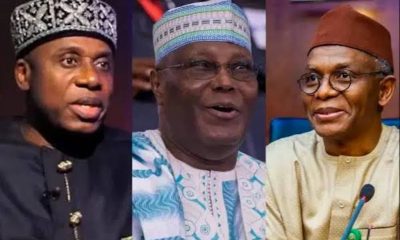Tech
Microsoft says China using AI to sow division in US

China is ramping up use of AI-generated content and fake social media accounts to inflame division in the United States and elsewhere, according to the latest report from Microsoft’s threat center.
Beijing has “doubled down” on targets and increased sophistication of its influence operations, Microsoft threat analysis center general manager Clint Watts said in a report released late Thursday.
“China is using fake social media accounts to poll voters on what divides them most to sow division and possibly influence the outcome of the US presidential election in its favor,” Watts said in the report.
“China has also increased its use of AI-generated content to further its goals around the world” as well as in the US.
Chinese influence operations continue to “opportunistically jump” on events such as a train derailment in Kentucky and wildfires in Maui to promote mistrust of the US government, according to the report.
The polling about controversial US domestic issues “indicates a deliberate effort to understand better which US voter demographic supports what issue or position and which topics are the most divisive, ahead of the main phase of the US presidential election,” Watts wrote.
The report concluded there is little evidence that the influence operations have succeeded in swaying opinions thus far.
The threat center reported late last year that social media accounts “affiliated” with the Chinese government had used social media accounts to impersonate US voters to influence midterm elections in 2022.
“This activity has continued and these accounts nearly exclusively post about divisive US domestic issues such as global warming, US border policies, drug use, immigration, and racial tensions,” Watts wrote.
“They use original videos, memes, and infographics as well as recycled content from other high-profile political accounts.”
Microsoft saw a surge in the use of AI-generated content used to augment China-linked online influence operations aimed at the presidential election in Taiwan in January, according to Watts.
“With major elections taking place around the world this year, particularly in India, South Korea and the United States, we assess that China will, at a minimum, create and amplify AI-generated content to benefit its interests,” Watts wrote.
Microsoft’s report also noted that North Korea has begun to use AI to steal cryptocurrency, attack supply chains, and gather military intelligence more effectively.
Source: PUNCH NEWS

Tech
Court affirms NIBSS’ right to manage BVN database

A federal high court in Abuja has affirmed the legality of the Nigeria Inter-Bank Settlement System Plc (NIBSS) as the manager of the bank verification number (BVN) database.
In a judgment delivered on Friday, James Omotosho, presiding judge, ruled that NIBSS operations are consistent with the Central Bank of Nigeria (CBN) Act and other relevant financial laws.
NIBSS, represented by Wolemi Esan, a senior advocate of Nigeria (SAN), filed the suit.
The case listed the Incorporated Trustees of Digital Rights Lawyers Initiative, the CBN, and the attorney general of the federation (AGF) as first to third defendants.
NIBSS sought a declaration affirming that its management of BVN data does not violate Nigerians’ constitutional right to privacy or any other existing laws.
It also requested a perpetual injunction restraining any entity or individual, including the Digital Rights Lawyers Initiative, from contesting its statutory role.
The company argued that it was empowered to develop and regulate a nationwide infrastructure for electronic payments and fund transfers, and that the BVN system falls within this mandate.
NIBSS accused the Digital Rights Lawyers Initiative of repeatedly filing lawsuits, directly or through proxies, challenging its authority and claiming privacy rights violations.
In support, Kofo Abdulsalam-Alada, counsel for the CBN, filed a counter-affidavit stating that NIBSS’s role in managing the BVN database is lawful, constitutionally approved, and essential for financial security and system stability.
He cited Section 47(2) of the CBN Act (2007) and provisions of the Banks and Other Financial Institutions Act (BOFIA) 2020 to affirm the CBN’s authority to establish and regulate payment systems.
Delivering judgment, Omotosho ruled that the BVN initiative does not infringe on privacy rights and affirmed NIBSS’s authority to maintain the system.
He noted that the CBN’s regulatory powers are well-established in BOFIA 2020 and relevant laws.
“NIBSS has the power to manage the BVN. The court grants the reliefs of NIBSS as prayed,” the judge ruled.
He also issued a perpetual injunction restraining the Digital Rights Lawyers Initiative and any other parties from challenging NIBSS’s management of the BVN.
Omotosho concluded that the judgment is a judgment in rem, binding on all persons and entities unless overturned on appeal.
A judgment in rem is a court ruling that is binding on the whole world, rather than just the parties involved in the lawsuit.
Tech
NCC, stakeholders tackle rural connectivity challenges

The Nigerian Communications Commission (NCC) has collaborated with the Association for Progressive Communications and other institutional stakeholders towards addressing challenges confronting rural network connectivity in Nigeria.
The collaboration resulted in a two-day workshop hosted in Abuja from June 3-4, 2025, to explore policy framework for enabling community networks towards bridging the digital divide and accelerating socio-economic development in Nigeria’s underserved and unserved communities.
The forum brought together regulators, community leaders, technical experts and potential foreign investors, among others, to examine policy and regulatory barriers, explore innovative funding mechanisms, ensure sustainable renewable solutions and strengthen collaboration with stakeholders.
Addressing participants at the workshop, the Executive Vice Chairman of NCC, Dr. Aminu Maida, said the workshop is important to bridging the digital divide in Nigeria and foster inclusive social economic development.
“This workshop is an opportunity for all of us to harness the expertise, insights, and experiences of diverse stakeholders present here which includes the regulators, community leaders, technical experts and potential foreign providers to address the critical challenges such as affordable devices, access, licensing, spectrum allocation, infrastructure development, sustainability and institutional monitoring,” said Maida, who was represented by the Executive Commissioner, Technical Services, NCC at the event, Abraham Oshadami.
Maida said the workshop demonstrates the Commission’s commitment to advancing digital inclusion, particularly in underserved and unserved areas. “At NCC, we recognise the transformative potential of community center networks in achieving this important goal,” he said.
The EVC said NCC was committed to “this journey and views this workshop as a catalyst for meaningful change,” stating that the expertise, perspectives and commitments will shape the future where every Nigerian, regardless of his or her status, will have meaningful access to opportunities from digital connectivity.
In her remarks, Co-manager of the Association for Progressive Communications’ Local Network (LocNet) initiative, Kathleen Diga, noted that the collaboration was to tackle identified hindrances to digital inclusion. “This is a space where we can be open and exchange ideas of possibilities, opportunities that will remain in realising values of a diversified ecosystem.”
Diga said, “I believe this workshop presents a moment in time that we can explore the bottom-up approach in local communities, small social enterprises, corporative among others, which have the ability to fill some of the digital gaps that remain unfilled,” she said, adding emphasising the need to recognise that community centre connectivity exists and they are grow throughout the global south, which, she said, are a “strategic response to digital exclusion.”
The workshop featured presentations from the NCC, the Association for Progressive Communications and other institutional stakeholders such as the Rural Electrification Agency (REA) and the Central Bank of Nigeria (CBN) all geared towards exploring a joint policy framework to address rural digital divide.
The Association for Progressive Communications is a 35-year-old international network member-based organisation encouraging digital inclusion in the unserved communities, particularly with communities in the global south and the workshop, through its LocNet initiative aimed at crafting an enabling inclusive regulatory framework for community networks in Nigeria.
Tech
WhatsApp stops working on iPhone 6, 12 other phone models from June 2025

WhatsApp has ceased to function on several smartphones with older or outdated operating systems (OS) from June 1, 2025.
The messaging app has raised its minimum system requirements to improve security and performance, rendering it incompatible with certain phone models.
According to the update, iPhones must now run iOS 15.1 or later, while Android devices need at least Android 5.1. This means that support for models like the iPhone 5s, 6, and 6 Plus, the Samsung Galaxy S4, the Sony Xperia Z1, and others has been lost.
The update aims to enhance security and performance, as outdated devices can no longer support modern app features.
Users on older hardware have been strongly advised to back up chat histories and migrate to newer devices before June 1 to avoid service interruptions.
However, iPhone 6s, iPhone 6s Plus, and the first-generation iPhone SE will remain functional only if updated to iOS 15.8.4. Owners of these models are advised to install the latest iOS iteration to maintain access to WhatsApp.
Meta’s decision to phase out support for legacy operating systems is a proactive measure to ensure the app’s security and introduce enhancements, ultimately maintaining the app’s reliability and user experience.
Tech
WhatsApp rolls out new chatting features for users, full details emerge

Meta-owned instant messaging (IM) and voice-over-IP (VoIP) app WhatsApp has launched new, exciting features that promise to invigorate the users.
Apart from the new features, Meta has made improvements in the design with an aim to make chats more appealing and inventive for users.
These new features include various tools created to improve the visual appeal of messages, provide more personalised options, and streamline user interactions.
New Features Are
Camera effects: Meta has introduced camera effects with the help of which WhatsApp users can now choose from a range of 30 backgrounds, filters, and effects when taking and sharing photos or videos over their chats.
Selfie stickers: WhatsApp has added this new feature for users who love to create custom stickers and can now turn selfies into stickers easily. However, this feature is available only on Android devices. The iOS version will follow soon.
Share sticker packs: Users can now easily share sticker packs with other users. If a user spots a sticker pack that they think the other user will like, they can share it directly within their chats.
Quicker reactions: WhatsApp has also introduced quicker reactions with which users can now double-tap a message to quickly react, with the app displaying a list of their most-used reactions for fast access.
Earlier, in October 2024, WhatsApp expanded the chat filter feature, adding the ability for users to create custom lists that contain specific chats of their choice while in November, the ability to transcribe voice messages was added, allowing users to read out what was said in a voice message, rather than listening to the audio.
In December 2024, WhatsApp introduced several new video calling features, including the ability to select specific participants from a group to make a call, rather than calling all group members. Visual effects also became available, adding visual filters to a user’s video feed.
In December 2024, WhatsApp introduced a reverse image search feature, allowing users to verify image authenticity directly within the app using Google Search.
India.com
Tech
Fresh trouble for iPhone users as Trump threatens Apple; full details emerge

In a fresh wave of challenges for iPhone users, U.S. President Donald Trump has issued a significant ultimatum regarding Apple Inc.
According to Trump, the tech giant would be subjected to a hefty tariff of 25 percent on all iPhones manufactured overseas and imported into the United States. This move is part of a broader strategy aimed at reshaping trade relations and encouraging domestic production.
The implications of such a tariff could have far-reaching effects on both Apple and its loyal customer base, raising concerns about affordability and accessibility of iPhones in the US market.
He later added that Samsung and other phone makers would face a similar tariff, “otherwise it wouldn’t be fair”. The tariffs would likely take effect at the end of June, he said.
Trump posted the comments on Apple on his social network Truth Social. “I have long ago informed [CEO] Tim Cook of Apple that I expect their iPhone’s that will be sold in the United States of America will be manufactured and built in the United States, not India, or anyplace else,” he said. “If that is not the case, a Tariff of at least 25% must be paid by Apple to the U.S.,” the president wrote.
His comments on Samsung “and anybody that makes that product” were added later in response to questions at the White House, the Wall Street Journal reports.
Apple investment in US
Cook met with Trump at the White House this week, according to a White House official. Apple has previously pledged to spend USD 500 billion on its operations in the US. However, this is largely with or by suppliers, and Apple continues to manufacture iPhones in Asia.
The US government previously exempted smartphones from most of its tariffs on China. In response to the threat of a China-US trade war, Apple started early this year shifting more production to India and Vietnam with its partner Foxconn in order to avoid any impact.
The US is Apple’s biggest market for iPhones, and the company accounts for over half of the smartphone market there.
According to figures from Counterpoint Research, Apple had a 57 percent share of the US market in Q1 2025, followed by Samsung with 25 percent and Lenovo (Motorola) with 11 percent.
Shipments of iPhones and other smartphones made in China to the US fell to their lowest level since 2011 in April, according to Chinese customs data reported separately by Bloomberg.
Smartphone exports were down 72 percent to less than USD 700 million during the month, compared to a 21 percent fall in overall Chinese exports to the US. Smartphones were the number one export from China to the US in the year 2024.
Tech
MTN Group, Airtel Africa agree to network sharing in Nigeria

MTN Group and Airtel Africa have agreed to share network infrastructure in Nigeria and Uganda while complying with local regulatory and statutory requirements, as reported by Telecompaper.
They aim to improve network cost efficiencies, expand coverage and enhance mobile services for millions of customers, particularly those in remote and rural areas.
They are exploring opportunities in other markets, including Congo-Brazzaville, Rwanda and Zambia, and considering agreements for areas such as RAN sharing, fibre infrastructure sharing and, if necessary, the construction of fibre networks.
The two companies said they are committed to working with other mobile operators in the countries where they have a presence, to achieve the advantages of network sharing.
The parties will continue to function as independent market entities and will compete freely in shared markets. This engagement does not preclude the parties from collaborating with other operators in any respective market, they added.

 Sports2 weeks ago
Sports2 weeks agoOfili: ‘Nigeria doesn’t deserve you’ – Fans react as athlete switches allegiance to Turkey

 News2 weeks ago
News2 weeks agoUS Back Out: Angry Trump withdraws support for Israel, issues fresh warning, “Do not drop those bombs”

 Sports2 weeks ago
Sports2 weeks ago‘Don’t sign him, he doesn’t follow instructions’ — Club warned against signing Super Eagles star

 Spotlights2 weeks ago
Spotlights2 weeks agoNo More War: US plots Donald Trump impeachment over unauthorized Iran bombing

 Spotlights2 weeks ago
Spotlights2 weeks agoAtiku sidelined again as ADA picks Presidential Flagbearer

 Politics1 week ago
Politics1 week agoFresh crisis hits coalition as El-Rufai, Obi may pull out over Atiku’s silence game

 Politics2 weeks ago
Politics2 weeks ago2027: Shettima fights back over plot to drop him as Vice President; crisis hits APC




















